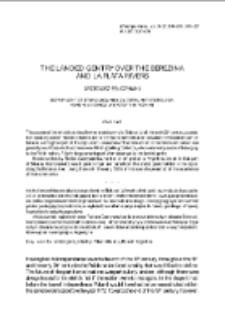- Search in all Repository
- Literature and maps
- Archeology
- Mills database
- Natural sciences
Advanced search
Advanced search
Advanced search
Advanced search
Advanced search

Object
Title: The Landed Gentry Over the Berezyna River and La Plata
Subtitle:
Ethnologia Polona 31-32 (2010-2011)
Publisher:
Institute of Archaeology and Ethnology Polish Academy of Sciences
Place of publishing:
Description:
Type of object:
Abstract:
The purpose of the article is to describe the landed gentry in Belarus. Until the early 20th century, population speaking eastern Slavonic dialects and of Orthodox denomination prevailed in the eastern part of Belarus. Among this part of the population, awareness of the connection to the Belarusian nation was generally low. Poles who lived there were Polish-speaking Catholics, who were mostly aware of belonging to the Polish nation. A fairly large percentage of them belonged to the landed gentry. Novels written by Florian Czarnyszewicz, written in emigration to Argentina, are set in that part of Belarus. Czarnyszewicz was of gentry origin and came from the landed gentry settled in the region along the Berezina river. Living there until the early 1920’s, in his novels he presented all the experiences of that community
References:
Czarnyszewicz Florian, 1953, Wicik Żywica, Buenos Aires
Czarnyszewicz Florian, 1958, Losy pasierbów, Libella, Paris
Czarnyszewicz Florian, 1963, Chłopcy z Nowoszyszek, Polska Fundacja Kulturalna, London
Czarnyszewicz Florian, 1991, Nadberezyńcy, FIS, Lublin
Danilewicz-Zielińska Maria, 1999, Szkice o literaturze emigracyjnej, Zakład Narodowy im. Ossolińskich, Wrocław
Iwanow Mikołaj, 1991, Pierwszy naród ukarany. Polacy w Związku Radzieckim 1921–1939, PWN, Warsaw–Wroclaw
Kabzińska Iwona, 1999, Wśród „kościelnych” Polaków. Wyznaczniki tożsamości etnicznej (narodowej) Polaków na Białorusi, Instytut Archeologii i Etnologii PAN, Warsaw
Kabzińska Iwona, 2009, Między pragnieniem ideału a rzeczywistością. Polacy na Litwie, Białorusi i Ukrainie w okresie transformacji systemowej przełomu XX i XXI stulecia, Zakład Wydawniczy Letter Quality,Warsaw
Kotowicz-Borowy Irena, 2007, Drobna szlachta jako zjawisko kulturowe [in:] Dziedzictwo kulturowe pograniczy. Drobna szlachta. Wydawnictwo SGGW, Warsaw, pp. 39–47
Kowalczyk Andrzej Stanisław, 1990, Końcówka. Floriana Czarnyszewicza pożegnianie z Kresami, “Tygodnik Powszechny”, No 25, pp. 7
Mironowicz Eugeniusz, 1999, Białoruś, Wydawnictwo Trio, Warsaw
Radzymińska Józefa, 1984, Książki i przyjaźnie, Instytut Wydawniczy PAX, Warsaw
Stempowski Jerzy, 2001, Szkice literackie. Klimat życia i klimat literatury 1948–1967, Warsaw
Wańkowicz Melchior, 1953, Przedmowa [in:] Czarnyszewicz Florian, Wicik Żywica, Buenos Aires, pp. 5–12
Zadencka Maria, 1955, W poszukiwaniu utraconej ojczyzny. Obraz Litwy i Białorusi w twórczości wybranych polskich pisarzy emigracyjnych, UU, Uppsala
Relation:
Volume:
Start page:
End page:
Detailed Resource Type:
Format:
Resource Identifier:
oai:rcin.org.pl:61380 ; 0137-4079
Source:
IAiE PAN, call no. P 366 ; IAiE PAN, call no. P 367 ; IAiE PAN, call no. P 368 ; click here to follow the link
Language:
Digitizing institution:
Institute of Archaeology and Ethnology of the Polish Academy of Sciences
Original in:
Library of the Institute of Archaeology and Ethnology of the Polish Academy of Sciences
Access:
Object collections:
- Digital Repository of Scientific Institutes > Partners' collections > Institute of Archeology and Ethnology PAS > Institute Publications
- Digital Repository of Scientific Institutes > Partners' collections > Institute of Archeology and Ethnology PAS > Institute Publications > Current Journals
- Digital Repository of Scientific Institutes > Literature > Journals/Articles
- Digital Repository of Scientific Institutes > Partners' collections > Institute of Archeology and Ethnology PAS > Institute Publications > Current Journals > Ethnologia Polona
Last modified:
Feb 2, 2022
In our library since:
Dec 27, 2016
Number of object content downloads / hits:
57
All available object's versions:
https://rcin.org.pl./publication/76152
Show description in RDF format:
Show description in RDFa format:
Show description in OAI-PMH format:
| Edition name | Date |
|---|---|
| Pełczyński, Grzegorz, 2010-2011, The Landed Gentry Over the Berezyna River and La Plata | Feb 2, 2022 |
Objects Similar
Kubera, Jacek
Schwarcz, Gyöngyi
Chorol, Tsering
Gondor-Wiercioch, Agnieszka

 INSTYTUT ARCHEOLOGII I ETNOLOGII POLSKIEJ AKADEMII NAUK
INSTYTUT ARCHEOLOGII I ETNOLOGII POLSKIEJ AKADEMII NAUK
 INSTYTUT BADAŃ LITERACKICH POLSKIEJ AKADEMII NAUK
INSTYTUT BADAŃ LITERACKICH POLSKIEJ AKADEMII NAUK
 INSTYTUT BADAWCZY LEŚNICTWA
INSTYTUT BADAWCZY LEŚNICTWA
 INSTYTUT BIOLOGII DOŚWIADCZALNEJ IM. MARCELEGO NENCKIEGO POLSKIEJ AKADEMII NAUK
INSTYTUT BIOLOGII DOŚWIADCZALNEJ IM. MARCELEGO NENCKIEGO POLSKIEJ AKADEMII NAUK
 INSTYTUT BIOLOGII SSAKÓW POLSKIEJ AKADEMII NAUK
INSTYTUT BIOLOGII SSAKÓW POLSKIEJ AKADEMII NAUK
 INSTYTUT CHEMII FIZYCZNEJ PAN
INSTYTUT CHEMII FIZYCZNEJ PAN
 INSTYTUT CHEMII ORGANICZNEJ PAN
INSTYTUT CHEMII ORGANICZNEJ PAN
 INSTYTUT FILOZOFII I SOCJOLOGII PAN
INSTYTUT FILOZOFII I SOCJOLOGII PAN
 INSTYTUT GEOGRAFII I PRZESTRZENNEGO ZAGOSPODAROWANIA PAN
INSTYTUT GEOGRAFII I PRZESTRZENNEGO ZAGOSPODAROWANIA PAN
 INSTYTUT HISTORII im. TADEUSZA MANTEUFFLA POLSKIEJ AKADEMII NAUK
INSTYTUT HISTORII im. TADEUSZA MANTEUFFLA POLSKIEJ AKADEMII NAUK
 INSTYTUT JĘZYKA POLSKIEGO POLSKIEJ AKADEMII NAUK
INSTYTUT JĘZYKA POLSKIEGO POLSKIEJ AKADEMII NAUK
 INSTYTUT MATEMATYCZNY PAN
INSTYTUT MATEMATYCZNY PAN
 INSTYTUT MEDYCYNY DOŚWIADCZALNEJ I KLINICZNEJ IM.MIROSŁAWA MOSSAKOWSKIEGO POLSKIEJ AKADEMII NAUK
INSTYTUT MEDYCYNY DOŚWIADCZALNEJ I KLINICZNEJ IM.MIROSŁAWA MOSSAKOWSKIEGO POLSKIEJ AKADEMII NAUK
 INSTYTUT PODSTAWOWYCH PROBLEMÓW TECHNIKI PAN
INSTYTUT PODSTAWOWYCH PROBLEMÓW TECHNIKI PAN
 INSTYTUT SLAWISTYKI PAN
INSTYTUT SLAWISTYKI PAN
 SIEĆ BADAWCZA ŁUKASIEWICZ - INSTYTUT TECHNOLOGII MATERIAŁÓW ELEKTRONICZNYCH
SIEĆ BADAWCZA ŁUKASIEWICZ - INSTYTUT TECHNOLOGII MATERIAŁÓW ELEKTRONICZNYCH
 MUZEUM I INSTYTUT ZOOLOGII POLSKIEJ AKADEMII NAUK
MUZEUM I INSTYTUT ZOOLOGII POLSKIEJ AKADEMII NAUK
 INSTYTUT BADAŃ SYSTEMOWYCH PAN
INSTYTUT BADAŃ SYSTEMOWYCH PAN
 INSTYTUT BOTANIKI IM. WŁADYSŁAWA SZAFERA POLSKIEJ AKADEMII NAUK
INSTYTUT BOTANIKI IM. WŁADYSŁAWA SZAFERA POLSKIEJ AKADEMII NAUK




































